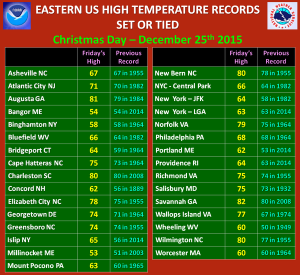 by Adam Siegel (cross posted from Get Energy Smart Now)
by Adam Siegel (cross posted from Get Energy Smart Now)
Shhh … there is nothing to be seen here. Even with perhaps the nation’s top political cartoonist on climate change, Tom Toles, and the excellent climate/energy/science reporting of the likes of Chris Mooney, article after article in The Washington Post discussing ‘weird weather’ in the DC area and elsewhere goes with nary a mention of climate change.
See the 26 December front-page, above-the-fold article “White Hot Christmas: Some rejoice in D.C’s record-setting warmth, but others are unnerved.”
Even as Washingtonians found themselves luxuriating in the steam bath that was Christmas 2015, even as decades of meteorological records were shattered, they could not help but feel out of sorts, as if they were indulging in something that was not quite right.
The article tells us that DC saw “the highest Christmas [temperature] reading in more than 30 years” amid “ever-toastier conditions” yet, amid dozens of column inches, we hear of “end times” and recipes for a warmer Christmas but the words “climate change” don’t appear.
Speaking of End Times, the online version’s headline is telling:
‘Jesus might be coming back .?.?. Or it’s something else. I don’t know.’
Within the article,
Lakisha Webster’s eyes narrowed as she struggled to make sense of the forces that may have conspired to turn what she once knew as winter into the strangest of summers.
“Jesus might be coming back,” Webster, 44, said, while her young grandson test-drove a new $800 dirt bike. “Or it’s something else. I don’t know. But it’s scary — a little bit scary.”
The voice of confusion and conflict — enjoyment and/or discomfort. A long, front-page article without any placement of context. (For an alternative approach, capturing the dissonance between enjoying warm December weather while understanding climate change impacts, see #Climate change has changed my (and your) backyard.)
The author, Paul Schwartzman, does know climate change exists. After all, he reported on the Pope at the UN and discussed how ‘mainstream’ Republicans see climate science denial costing votes in Virginia.
Establishment Republicans contend they’re losing statewide because moderate voters are wary of tea party and Libertarian candidates who espouse what they consider extreme views on issues such as climate change.
Although clearly aware of climate change, Schwartzman’s articles seem to have a tendency toward leaving it undiscussed. For example, a recent piece on Donald Trump discussed (analyzed even) his tweeting behavior yet didn’t mention @RealDonaldTrump’s climate science denial, which is such a strong example of Trump arrogant truthiness and erroneous assertions. (Although, perhaps because the article was campaign focused, Schwartzman didn’t see need to mention climate change because trump’s anti-science attitudes are so emblematic of the GOP and are shared across the Presidential candidates. Journalists seem too often to give GOP climate science denial a pass because, in the “horse race” approach to covering politics, a shared falsehood/erroneous opinion is irrelevant for differentiating candidates.)
[…]
Sadly, The Washington Post is not an isolated case. As discussed by Miles Grant: As December Heat Ends History’s Warmest Year, Media Still Shy Away From the Cause:
As wave after wave of record-breaking high temperatures grips huge swaths of America, media coverage of the December warmth has rarely been willing to discuss its cause. Reporters may be willing to point to a monster El Niño, but hardly have mentioned it’s launching its assault off a higher baseline temperatures from human-caused climate change, resulting in some jaw-dropping record highs.
Of 259 newspaper stories that touched on December’s warmth between December 1 and 14, 25 made the link to El Niño, but only seven made the tie to climate change. Network news coverage has been no more willing to connect the dots. Of 67 mentions of December warmth, six linked it to El Niño, but only one talked about the climate connection.
Schwartzman’s article about DC residents’ reactions to December 2015’s spring-like temperatures might have had zero mention of climate change because perhaps zero interviewees mentioned it. Perhaps zero mentioned it, however, because the connection is absent from media coverage.
P.S. To be clear, the absence is not 100%. Putting aside other Washington Post work, like Chris Mooney’s, Weird weather pattern turns weather upside-down across US professional an example of professional handling of climate change impacts on extreme weather. With an article about weather extremes, there is this context providing paragraph within the article:
In addition to El Nino, a weather pattern called the North Atlantic Oscillation is also helping keep cold air bottled up in the Arctic. Combine that with warm temperatures around the planet from man-made global warming and you have a recipe for intense weather.
That isn’t so hard, is it?












